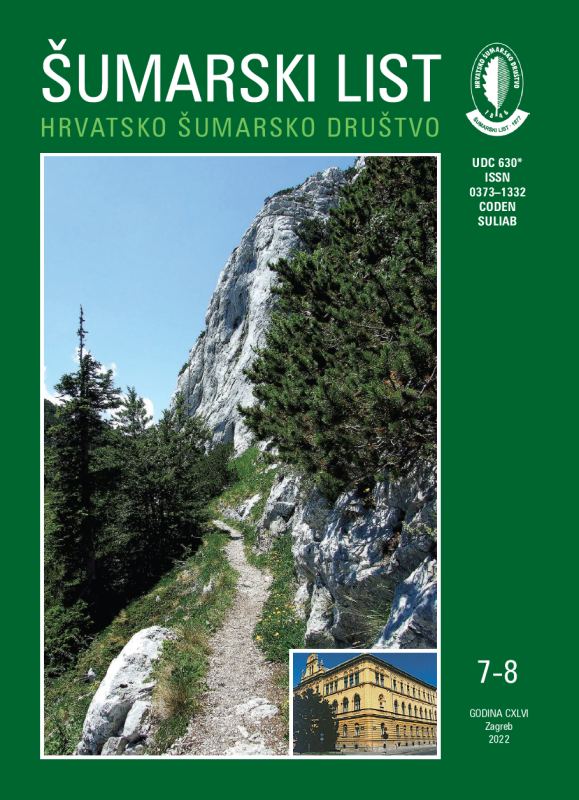
broj: 7-8/2022
pdf (12,97 MB) |
|
||||||||||||||
| RIJEČ UREDNIŠTVA | ||
| Uredništvo | ||
| Why do we lag behind in the green transition and energy independence? pdf HR EN | 281 | |
| IZVORNI ZNANSTVENI ČLANCI | ||
| Damir Ugarković, Ivica Tikvić, Ivana Grgurić, Ivan Perković, Nataša Hulak, Vibor Roje, Petar Šutalo, Krešimir Popić | UDK 630* 114.7 (001) https://doi.org/10.31298/sl.146.7-8.1 | |
| Enzymatic activity of forest soil in damaged forest ecosystem of silver fir with hard fern pdf HR EN | 283 | |
| Krunoslav Sever, Antonia Vukmirović, Luka Hodak, Saša Bogdan, Ida Katičić Bogdan, Daniel Krstonošić, Tomislav Karažija, Jozo Franjić, Željko Škvorc | UDK 630*231 + 233 (001) https://doi.org/10.31298/sl.146.7-8.2 | |
| Functional adaptation of natural sessile oak and common beech saplings on different habitat conditions pdf HR EN | 293 | |
| Vladan Popović, Darka Šešlija Jovanović, Aleksandar Lučić, Ljubinko Rakonjac, Sanja Jovanović, Aleksandar Vasiljević, Danijela Miljković | UDK 630* 164 (001) https://doi.org/10.31298/sl.146.7-8.3 | |
| Spatial variation of morphological needle traits of silver fir (Abies alba Mill.) populations in the Balkan peninsula in relation to climatic factors pdf HR EN | 309 | |
| Vojislav Dukić, Miroslav Mirković, Branko Stajić, Danijela Petrović, Marko Kazimirović, Srđan Bilić | UDK 630* 111.8 (001) https://doi.org/10.31298/sl.146.7-8.4 | |
| Comparative analysis of the influence of climate factors on the radial growth of autochthonous pine species (Pinus spp.) in central Bosnia and Herzegovina pdf HR EN | 319 | |
| Summary In central Bosnia and Herzegovina, in the Zavidovići-Teslić area, the study of the radial growth of Austrian and Scots pine (autochthonous pine species) trees was conducted using the dendrochronological method in order to identify the differences between the species in terms of the influence of climatic variables on the tree ring formation. Trees were sampled in five experimental areas or five sites. The first site had a Scots pine stand, while the second had an Austrian pine stand, and the other three sites had mixed stands of Scots and Austrian pine. Cross-dating was conducted using visual on-screen techniques of CDendro software and statistical methods using Cofecha software. The tree ring series were standardized using the Arstan program and cubic smoothing spline. It produced Scots pine regional chronology, 145 years long (1870-2014), and Austrian pine regional chronology, 180 years long (1835-2014). Correlation analysis of the relationship between the index of tree-ring width and precipitation and temperature in the characteristic periods of the year showed a negative effect of temperature (except in winter months) and a positive effect of precipitation on the tree ring formation. The statistically significant dependence of the tree-ring width index on the SPEI indices indicates a significant impact of moisture deficiency on the tree ring formation in the period from June to August (r = 0.33 in June, r = 0.45 in July and r = 0.47 in August) for Scots pine and in the period from June to September (r = 0.36 in June, r = 0.43 in July, r = 0.47 in August and r = 0.30 in September) for Austrian pine. The analysis of the relationship between climatic parameters and the chronologies of Scots and Austrian pine shows similar relationships between radial growth and climate but the influence of climate is somewhat more pronounced in Austrian pine. In the study area, the radial growth of both tree species is significantly determined by climate conditions. In other words, the chronology of these species has a good climatic signal, especially the drought signal in the summer months. Key words: dendrochronology; tree-ring width; Austrian pine; Scots pine; climate; Bosnia and Herzegovina | ||
| Abdullah E. Akay, H. Hulusi Acar, Buse Kalkan | UDK 630*907.1 (001) https://doi.org/10.31298/sl.146.7-8.5 | |
| Using GIS techniques for modeling of anthropogenic noise propagation generated by a chainsaw in forest harvesting pdf HR EN | 333 | |
| Alptug Sari | UDK 630*156 (001) https://doi.org/10.31298/sl.146.7-8.6 | |
| Maximum Entropy Niche-Based Predicting of Potential Habitat for the Anatolian Leopard (Panthera pardus tulliana Valenciennes, 1856) in Türkiye pdf HR EN | 345 | |


